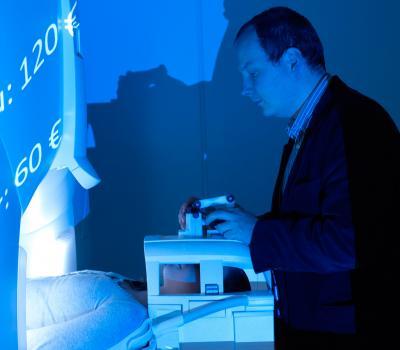Trust is an essential basis for business relationships but it can be easily shaken if one business partner exhibits dishonest behavior. And so a subconscious strategy to help avoid the negative emotions associated with any breaches of trust may cause some to prefer computers over people, according to a new paper.
When individuals engage in risky business transactions with each other, they may end up being disappointed and so they'd rather leave money decisions to a computer, says Prof. Dr. Bernd Weber from the Center for Economics and Neuroscience (CENs) at the University of Bonn. "As a result, people are not all that eager to put their trust in others."
Psychologists call this attitude "betrayal aversion" – people try to avoid being disappointed by potential breaches of trust by never having to trust.
Weber, Prof. Dr. Jason A. Aimone from Baylor University and Prof. Dr. Daniel Houser from George Mason University examined the effects betrayal aversion has on simple financial decisions. A total of 30 subjects played a computer game at George Mason University in Arlington that promised real monies to the winners. At the University of Bonn, the same number of subjects then made their decisions based on the results of the earlier experiment. And while the Bonn subjects were responding to their gaming partners' decisions made earlier in Arlington, their brain activity was measured by means of MRI scans.

Prof. Bernd Weber. Credit: (c) Photo: University of Bonn
Sharing fairly or making a profit at the other person's expense?
In this experiment, the test subjects in Bonn were able to select whether they and their US partners would get one euro each only, or whether they wanted to have a higher amount – i.e., 6 euros – divided up. However, the latter variant came with a risk. So, for example, the other player might get as much as 5.60 euros while the Bonn player would be left with only 40 Cents.
The actual dividing of the amount, which came in a second step, could be left either to one's partner or to the computer. However, the computer gave out exactly the same decisions as the real test subjects. "So, from the point of view of winnings, there was no difference whether the other player or the machine divided the amount," explained Prof. Weber. "And the subjects had explicitly been told so from the very start."
Even though the winnings were exactly the same in the end, more subjects put their trust into the computer. When the money was divided by the computer, 63 percent of subjects trusted the process and only 37 percent preferred taking just the one euro. But if the arrangement was that the human partners would make the decision, only 49 percent of test subjects trusted them – 51 percent would rather take the more secure, small amount.
"These results show that more subjects prefer to leave risky decisions in which they may be betrayed to an impersonal device, thus avoiding the negative feeling that comes from having wrongly trusted a human," said Prof. Weber, adding that obviously a breach of trust committed by an impersonal computer was less emotionally stressful than if had been a private business partner.
If image interpretations are meaningful, the brain's frontal insula was especially active
The University of Bonn's subjects also showed interesting brain activities as measured in MRI scans. In the process of making financial decisions, the frontal insula was especially active when it was another player who made the decision on how to divide the amount.
"This area of the brain is always involved when negative emotions such as pain, disappointment or fear are activated," explained Prof. Weber. He added that the fact that the frontal insula was activated is a clear indication that negative emotions played an important role in these situations.
Financial decisions are very complex. "This is a very contrary phenomenon. Many studies show that the anonymity of business partners on the Internet results in a loss of trust," said Weber. "But our results indicate that this anonymity can also help avoid negative feelings." He added that these decision processes in financial transactions would yet have to be studied in more detail.




Comments